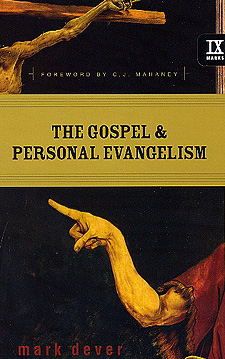This is a short book - 119 pages long - written in an easy-to-read style with chapters that rarely stray over 15 pages. Chapters include material on why we don't evangelise, what the gospel is, who should evangelise, how we should evangelise, what should we do after we evangelise and why we should evangelise. The book is written by Mark Dever who is the senior pastor of Capitol Hill Baptist Church in Washington DC and an executive director of 9 Marks ministries. In some ways it is like John Chapman's book Know and Tell the Gospel although being an American book it may reach a different audience.
 Dever has a real heart for the gospel and this clearly comes out in book. Both from his own stories and those of others. There is a particular moving story of John Harpur who sought to evangelise as he drowned after the Titanic sank. In the chapter on the excuses we make not to evangelise, Dever spotlights those excuses which equally relevant to Sydneysiders as to believers in the USA. He also helpfully works through how to overcome our fears and doubts and what to do.
Dever has a real heart for the gospel and this clearly comes out in book. Both from his own stories and those of others. There is a particular moving story of John Harpur who sought to evangelise as he drowned after the Titanic sank. In the chapter on the excuses we make not to evangelise, Dever spotlights those excuses which equally relevant to Sydneysiders as to believers in the USA. He also helpfully works through how to overcome our fears and doubts and what to do.
In the chapter about the message itself, Dever spends a good deal of space discussing what the Gospel is not. He correctly identifies a large number of modern misrepresentations: that it can be summarised by ‘God is love’; that Jesus wants to be our friend; or that we should simply live rightly. He emphasises that we also need to explain God’s holiness, our sinfulness and the need for repentance and living a life of thankfulness to God for all that He has done. Dever sees all Christians need to be able to share the gospel and also live lives worthy of it. We are to evangelise with honesty, joy and urgency:
"Honesty and urgency with no joy give us a grim determination (read Philippians). Honesty and joy with no urgency give us carelessness about time (Read 2 Peter). And urgency and joy with no honesty leads us into distorted claims about immediate benefits of the gospel (Read 1 Peter)" - Mark Dever
Mark Dever encourages his readers to pray for people, read the Bible with them, be clear, provoke self-reflection and use the church in our evangelism. He says that evangelism is not merely imposition, personal testimony, social action nor apologetics. Further, it is not the same as the results of evangelism. His helpful book underlines that evangelism is not the conversion of believers but the accurate telling of the Gospel message. This should free Christians from feeling failure when there is no obvious response. Toward the end of the book there is also a discussion of what to do when people have both negative and positive responses to the gospel.
The book has little discussion of popular objections to the gospel. Likewise it does little to address postmodernism, although Dever has a useful chapter in another book Telling the Truth edited by Don Carson on this very topic .It is a pity discussion style questions were not included at the end of the text as it would be a great resource for small groups in churches and even Christian groups at school. Church leaders may find some of the chapters lend themselves to other forms of ministry. For example the chapter on "Why don' t we evangelise " could be easily turned into a series of role-plays or skits in other contexts.
I would encourage all Christians to read this book. Our love for God, the lost and our desire to be obedient, coupled with our knowledge of God's sovereignty mean it is worthwhile being reinspired to keep at it or to begin evangelism for the first time.
Elizabeth George M.Ed., B.Ec., P.T.C is a member of St Paul’s Anglican Church, Carlingford























